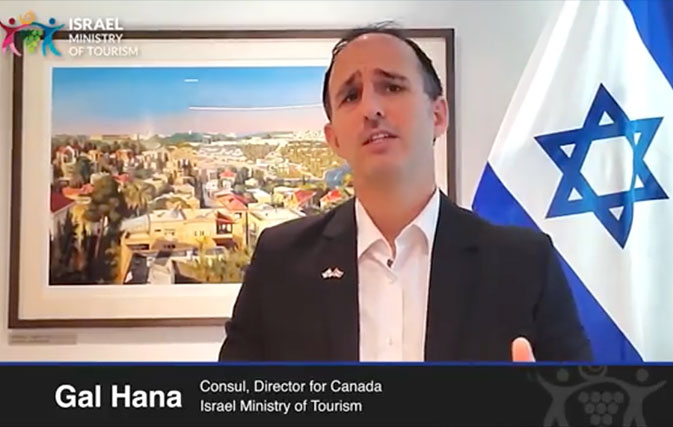TORONTO — If there’s any sort of silver lining for Israel amid the COVID-19 pandemic, it’s that relatively low case numbers, at least compared to many parts of the world, should give travellers confidence in the destination.
That was the take from hotel and tour operator presenters during yesterday’s virtual conference, ‘Israel | Tourism 3.0’.

Gal Hana, Director for Canada, Israel Ministry of Tourism
The event was produced by Travelweek and participation was strong, with viewership totalling 1,128 including Zoom participants and Facebook Live.
Hosted by Gal Hana, Director for Canada, Israel Ministry of Tourism with a helping hand from Shai DeLuca, well known to fans of CityTV’s Cityline, the online event featured panel discussions and more with top Israeli hoteliers, tour operators and tech companies, as well as keynote speeches from entrepreneur Yanki Margalit, and futurist Dr. Ian Yeoman.
“We’re starting the new year with optimistic news about the vaccines,” says Hana, who advocated an “agile, swift and quick approach” when it comes to post-pandemic travel industry strategies. “Although many prefer a comfortable life without surprises and crises or even unnecessary challenges, those are actually catalysts for improvement and innovation. The Chinese word for ‘crisis’ is combined from two elements: one represents risk and the other opportunity. Israel has had many challenges over the years that contributed to the innovation and creativity ecosystem.”
“Q2 2021 WILL BE THE STARTING POINT”
Of keen interest for the travel industry during yesterday’s ‘Israel | Tourism 3.0’ conference was input from travel companies dealing with COVID’s impact on tourism, especially the hotels and tour operators.
“If I had been part of the movie trilogy ‘Back to the Future’, I would have definitely said, ‘don’t ever go to 2020’,” joked Lior Mucznik, General Manager, Eilat Region, Dan Hotels.
He added: “But on a serious note, I would like to think that in three to six months COVID-19 will be history, making 2021 one of the best years in the past decade.”
Mucznik echoed the feelings of many of the presenters when he said that domestic travel has been a saving grace for Israel’s tourism industry amid the pandemic. “From the start we knew we should rely on our domestic market,” he said.
Uri Sharon, Commercial Director, Abraham Hostels & Tours, says Israel will win favour with inbound travellers for how it handled the COVID crisis. “I think there is a lot of trust for Israel with how the country dealt with the crisis,” he said.
And Haim Douk, Chief Marketing Officer, Prima Hotels, Israel, said he sees the vaccine as a game-changer. “The second quarter of 2021 will be the starting point” to recovery, said Douk. Since December 2020, about two million Israelis, or about 25% of the country’s population, have received the first dose of the Pfizer-BioNTech vaccine.
“THE MOTIVATION OF FAITH IS VERY STRONG”
Top tour operators and MICE specialists took part in the ‘Israel | Tourism 3.0’ event as well, including The Peerless Travel Group, Eshet Incentives & Conferences, and Nazarene Tours.
Artzi Korostelev, Executive Vice President, The Peerless Travel Group, said the VFR market, already very strong for Israel, would be the first sector to rebound for Israel’s tourism industry.
Also a perennial performer, and one that will bounce back just as quickly as VFR, is the faith-based market, says Korostelev.
Amnon Ben-David, CEO, Eshet Incentives & Conferences, agrees. “I do believe the faith-based market will be the first to travel to the Holy Land,” he said. “The motivation of faith is very strong.”
Meanwhile the MICE market has also been a strong performer for Israel, especially over the past few years, and Ben-David says he hopes to see this continue post-pandemic. “The last five years have been amazing for MICE to Israel, worldwide but especially from North America,” he says.
Peerless Travel’s Korostelev warns that while VFR and faith-based will be strong in the early months post-pandemic, “to bring back the average traveller will be much more challenging.”
The pandemic has put a dent in spending power for many travellers, who may have lost jobs during the pandemic and won’t be prioritizing travel any time soon. “Let’s face it, a visit to Israel has become a high-ticket item over the past decade,” said Korostelev.
He added: “Israel will have to remain competitive, not only around price points, but also on the marketing efforts and differentiation.”
STEPPING INTO THE FUTURE
Hana stressed the importance of technology and how it will play an essential role in rebuilding – and reshaping – the future of travel and tourism, particularly in Israel.
“Travel tech is a word that’s thrown in the air very easily but in Israel we take it seriously,” he said, citing innovations in Israel’s history, such as its sophisticated water system, that helped the country thrive. “The need, the necessity to address issues force us to get out of the comfort zone and these are game changes that motivate us to move forward.”
With the pandemic forcing Israel to once again adapt and evolve, Hana said the Ministry met two months ago to determine how to open the new year and “stimulate minds and inspire travel and tourism.” They discussed major trends and changes, future challenges and how they want to see tourism evolve into an “improving life” industry, one that’s more inclusive and responsible.
“Then it hit us – we realized we need to step into the future together with opinion leaders and professionals, led by data, information and knowledge,” said Hana, referencing ‘Israel | Tourism 3.0’ as a positive first step.
“Our goal for today was to dream big and dream together,” he added. “People need to travel, they need to explore, they’ve done so from the beginning of time. Tourism is here to stay, if not today then tomorrow and if not tomorrow, then the day after. It is not a question of if, it is more a question of when we will be able to welcome you back.”

